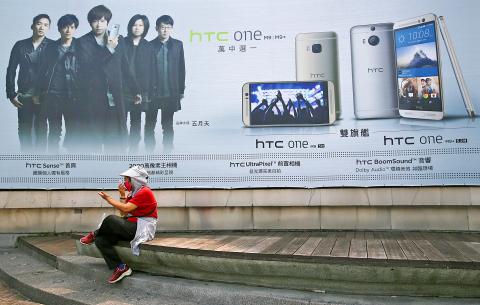The Taiwan Stock Exchange has removed smartphone maker HTC Corp (宏達電) from its index of blue-chip companies, signaling the dramatic decline of a business that was once the nation’s No. 1 brand and dazzled consumers with some of the world’s first Android handsets.
The exchange removed HTC from its FTSE TWSE Taiwan 50 index yesterday, after the company’s market value fell below the level required for inclusion in the market benchmark. The index lists Taiwan’s 50 biggest companies, which together represent 70 percent of the market’s value.
It is a humbling comedown for a company that once sold more than one in 10 of phones worldwide, received plaudits for innovation and represented Taiwan’s ambitions to spawn its own globally recognized electronics brands.

Photo: AP
In the past several years, HTC has struggled because of marketing and supply chain glitches, as well as intense competition from Apple Inc, Samsung Electronics and Chinese makers such as Xiaomi Inc (小米). Last month, it announced a 15 percent cut in its staff of about 15,700 after a second-quarter loss of US$247 million.
“They made a lot of missteps, but they were also caught in the crosshairs of a shift to commoditization of the market,” said John Brebeck, senior Taipei adviser with Hong Kong investment consultancy Peace Field.
HTC’s decline began as the number of smartphone vendors surged along with total shipments that reached 1.2 billion units last year, up 28 percent over 2013. Samsung and Apple captured the US through sales contracts with wireless carriers, while local Chinese brands, such as Lenovo (聯想) and Xiaomi, led in China, as HTC was trying to establish a customer base. Its world market share is estimated now at between 3 and 4 percent.
HTC attributes its losses to slowing use of high-end Android phones, changes in its product lineup and increased competition.
It will keep working on high-end handsets, along with connected devices and “virtual reality,” the company’s media office said last week.
“We remain confident that, with the diversification of our product portfolio and our continued investment in innovation, our market share will grow,” it said.
Analysts say HTC underspent on marketing, perhaps underestimating the impact of the iconic name recognition of Apple and aggressive publicity campaigns by Samsung.

Taiwanese suppliers to Taiwan Semiconductor Manufacturing Co. (TSMC, 台積電) are expected to follow the contract chipmaker’s step to invest in the US, but their relocation may be seven to eight years away, Minister of Economic Affairs J.W. Kuo (郭智輝) said yesterday. When asked by opposition Chinese Nationalist Party (KMT) Legislator Niu Hsu-ting (牛煦庭) in the legislature about growing concerns that TSMC’s huge investments in the US will prompt its suppliers to follow suit, Kuo said based on the chipmaker’s current limited production volume, it is unlikely to lead its supply chain to go there for now. “Unless TSMC completes its planned six

Intel Corp has named Tasha Chuang (莊蓓瑜) to lead Intel Taiwan in a bid to reinforce relations between the company and its Taiwanese partners. The appointment of Chuang as general manager for Intel Taiwan takes effect on Thursday, the firm said in a statement yesterday. Chuang is to lead her team in Taiwan to pursue product development and sales growth in an effort to reinforce the company’s ties with its partners and clients, Intel said. Chuang was previously in charge of managing Intel’s ties with leading Taiwanese PC brand Asustek Computer Inc (華碩), which included helping Asustek strengthen its global businesses, the company

Power supply and electronic components maker Delta Electronics Inc (台達電) yesterday said second-quarter revenue is expected to surpass the first quarter, which rose 30 percent year-on-year to NT$118.92 billion (US$3.71 billion). Revenue this quarter is likely to grow, as US clients have front-loaded orders ahead of US President Donald Trump’s planned tariffs on Taiwanese goods, Delta chairman Ping Cheng (鄭平) said at an earnings conference in Taipei, referring to the 90-day pause in tariff implementation Trump announced on April 9. While situations in the third and fourth quarters remain unclear, “We will not halt our long-term deployments and do not plan to

The New Taiwan dollar and Taiwanese stocks surged on signs that trade tensions between the world’s top two economies might start easing and as US tech earnings boosted the outlook of the nation’s semiconductor exports. The NT dollar strengthened as much as 3.8 percent versus the US dollar to 30.815, the biggest intraday gain since January 2011, closing at NT$31.064. The benchmark TAIEX jumped 2.73 percent to outperform the region’s equity gauges. Outlook for global trade improved after China said it is assessing possible trade talks with the US, providing a boost for the nation’s currency and shares. As the NT dollar